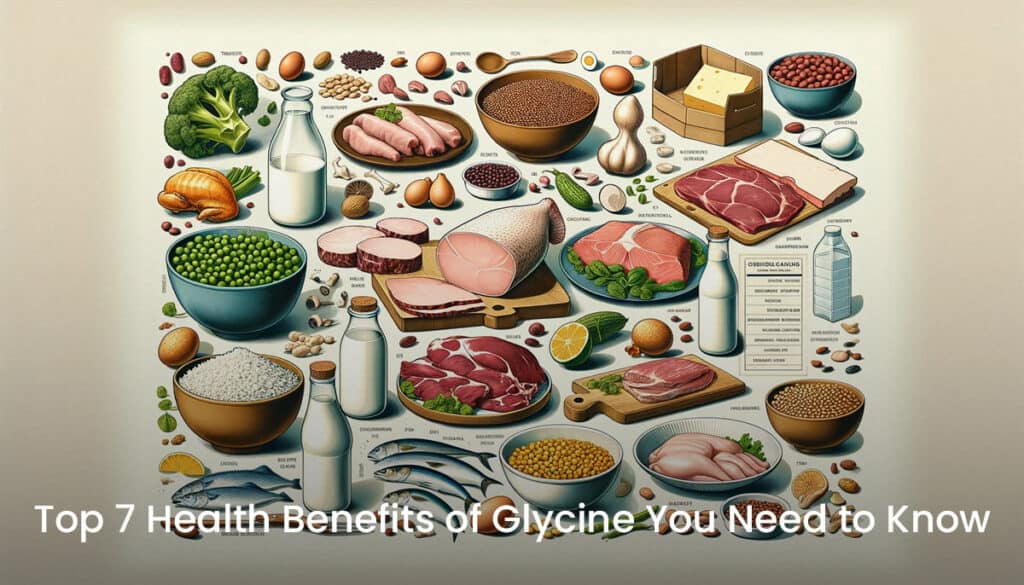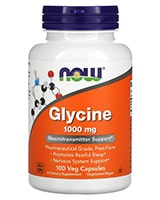

Glycine is a conditionally essential amino acid pivotal to numerous physiological and biochemical functions in the human body. This simple amino acid not only contributes to protein synthesis but also plays a crucial role in the central nervous system, immune response, and metabolic regulation. This article delves into the top health benefits of glycine, supported by scientific research and studies.
1. Enhances Sleep Quality and Supports Restful Nights
Glycine has been shown to significantly improve the quality of sleep. Research indicates that supplementing with glycine before bedtime can help individuals fall asleep faster and enter deeper[1]Kawai, N., Sakai, N., Okuro, M., Karakawa, S., Tsuneyoshi, Y., Kawasaki, N., Takeda, T., Bannai, M., & Nishino, S. (2015). The sleep-promoting and hypothermic effects of glycine are mediated by NMDA receptors in the suprachiasmatic nucleus. Neuropsychopharmacology, 40(6), 1405–1416. https://doi.org/10.1038/npp.2014.326, more restorative stages of sleep. Studies suggest that glycine may lower core body temperature, a critical factor for initiating sleep, and enhance the overall sleep experience by promoting a state of relaxation. For those struggling with insomnia or sleep disturbances, glycine presents a promising, natural alternative to improve sleep patterns without the use of pharmaceutical sleep aids.
2. Supports Mental Health and Cognitive Functions
Glycine’s impact on the brain is profound, offering benefits for both mental health and cognitive functions. It acts as an inhibitory neurotransmitter, potentially reducing symptoms of schizophrenia, obsessive-compulsive disorder (OCD), and depression. Glycine supplementation has been associated with improved memory and cognitive abilities[2]Kumar, P., Liu, C., Hsu, J. W., Chacko, S., Minard, C., Jahoor, F., & Sekhar, R. V. (2021). Glycine and N-acetylcysteine (GlyNAC) supplementation in older adults improves glutathione deficiency, oxidative stress, mitochondrial dysfunction, inflammation, insulin resistance, endothelial dysfunction, genotoxicity, muscle strength, and cognition: Results of a pilot clinical trial. Clinical and Translational Medicine, 11(3), e372. https://doi.org/10.1002/ctm2.372, making it an area of interest for researchers studying the treatment and management of mental health conditions. Its ability to modulate neurotransmitter activities in the brain highlights glycine’s potential as a supplement for enhancing mental well-being and cognitive performance.
3. Promotes Healthy Skin, Bones, and Connective Tissues
As a key component of collagen, glycine is vital for maintaining the strength and integrity of the skin, bones, and connective tissues. Collagen, the most abundant protein in the body, relies on glycine for its structure and stability. Supplementing with glycine can support the body’s natural collagen production[3]Kumar, P., Liu, C., Hsu, J. W., Chacko, S., Minard, C., Jahoor, F., & Sekhar, R. V. (2021). Glycine and N-acetylcysteine (GlyNAC) supplementation in older adults improves glutathione deficiency, oxidative stress, mitochondrial dysfunction, inflammation, insulin resistance, endothelial dysfunction, genotoxicity, muscle strength, and cognition: Results of a pilot clinical trial. Clinical and Translational Medicine, 11(3), e372. https://doi.org/10.1002/ctm2.372, leading to improved skin elasticity, faster wound healing, and stronger connective tissues. This amino acid’s contribution to bone health is also noteworthy, as it plays a role in bone density and may help prevent the onset of osteoporosis.
4. Protects the Heart and Reduces the Risk of Cardiovascular Diseases
Glycine’s benefits extend to cardiovascular health, where it has been observed to have protective effects. Research indicates that glycine can help regulate blood pressure and reduce inflammation[4]Aguayo-Cerón, K. A., Sánchez-Muñoz, F., Gutierrez-Rojas, R. A., Acevedo-Villavicencio, L. N., Flores-Zarate, A. V., Huang, F., Giacoman-Martinez, A., Villafaña, S., & Romero-Nava, R. (2023). Glycine: The smallest anti-inflammatory micronutrient. International Journal of Molecular Sciences, 24(14). https://doi.org/10.3390/ijms241411236, two significant risk factors for heart disease. Additionally, glycine may improve the body’s nitric oxide production, facilitating better blood flow and reducing the likelihood of arterial blockages. By supporting healthy cardiovascular function, glycine contributes to a lower risk of developing heart disease and other related conditions.
5. Aids in Blood Sugar Regulation and Diabetes Management
Glycine plays a significant role in metabolic processes, including the regulation of blood sugar levels and the management of diabetes. Studies have shown that glycine can improve insulin sensitivity[5]Kumar, P., Liu, C., Hsu, J. W., Chacko, S., Minard, C., Jahoor, F., & Sekhar, R. V. (2021). Glycine and N-acetylcysteine (GlyNAC) supplementation in older adults improves glutathione deficiency, oxidative stress, mitochondrial dysfunction, inflammation, insulin resistance, endothelial dysfunction, genotoxicity, muscle strength, and cognition: Results of a pilot clinical trial. Clinical and Translational Medicine, 11(3), e372. https://doi.org/10.1002/ctm2.372, allowing the body to use insulin more effectively and thus reduce blood glucose levels. For individuals with diabetes or those at risk of developing metabolic syndrome, glycine supplementation could offer a complementary approach to traditional treatments, helping to manage blood sugar levels and mitigate the risk of diabetes-related complications.
6. Enhances Athletic Performance and Muscle Recovery
The relationship between glycine and athletic performance is rooted in its role in the synthesis of creatine, a compound that provides energy to muscle cells during short bursts of intense activity. By supporting creatine production, glycine helps improve muscle strength, endurance, and recovery, making it a valuable supplement for athletes and physically active individuals. Furthermore, glycine contributes to the repair of damaged tissues, reducing recovery times and enhancing overall athletic performance. Its anti-inflammatory properties also play a part in mitigating muscle soreness and promoting faster recovery after exercise.
7. Detoxifies the Body and Supports Liver Health
Glycine’s contribution to detoxification processes and liver health is another of its remarkable benefits. It is a precursor to glutathione, one of the body’s most potent antioxidants, which plays a critical role in neutralizing free radicals and detoxifying harmful substances. Adequate levels of glycine, therefore, support the body’s natural detoxification pathways and protect liver cells from damage[6]Razak, M. A., Begum, P. S., Viswanath, B., & Rajagopal, S. (2017). Multifarious beneficial effect of nonessential amino acid, Glycine: A review. Oxidative Medicine and Cellular Longevity, 2017. https://doi.org/10.1155/2017/1716701. This is particularly beneficial in cases of alcohol-induced liver damage, where glycine has shown potential in mitigating the harmful effects of excessive alcohol consumption on the liver.
Conclusion
Glycine, with its wide-ranging impacts on sleep quality, mental health, physical structure, cardiovascular health, metabolic functions, athletic performance, and detoxification processes, emerges as a vital nutrient for overall well-being. Its benefits, supported by scientific research, underscore the importance of incorporating glycine-rich foods or supplements into one’s diet for health optimization. As with any supplement, consulting with a healthcare professional before starting glycine supplementation is recommended to ensure it aligns with individual health needs and conditions.
Buy Glycine Online Review Comparison Table
 Glycine | iHerb | 100 pills (1,000mg) | $10.40 |  Worldwide, AU | Visit Website >> |
References
| ↑1 | Kawai, N., Sakai, N., Okuro, M., Karakawa, S., Tsuneyoshi, Y., Kawasaki, N., Takeda, T., Bannai, M., & Nishino, S. (2015). The sleep-promoting and hypothermic effects of glycine are mediated by NMDA receptors in the suprachiasmatic nucleus. Neuropsychopharmacology, 40(6), 1405–1416. https://doi.org/10.1038/npp.2014.326 |
|---|---|
| ↑2, ↑3, ↑5 | Kumar, P., Liu, C., Hsu, J. W., Chacko, S., Minard, C., Jahoor, F., & Sekhar, R. V. (2021). Glycine and N-acetylcysteine (GlyNAC) supplementation in older adults improves glutathione deficiency, oxidative stress, mitochondrial dysfunction, inflammation, insulin resistance, endothelial dysfunction, genotoxicity, muscle strength, and cognition: Results of a pilot clinical trial. Clinical and Translational Medicine, 11(3), e372. https://doi.org/10.1002/ctm2.372 |
| ↑4 | Aguayo-Cerón, K. A., Sánchez-Muñoz, F., Gutierrez-Rojas, R. A., Acevedo-Villavicencio, L. N., Flores-Zarate, A. V., Huang, F., Giacoman-Martinez, A., Villafaña, S., & Romero-Nava, R. (2023). Glycine: The smallest anti-inflammatory micronutrient. International Journal of Molecular Sciences, 24(14). https://doi.org/10.3390/ijms241411236 |
| ↑6 | Razak, M. A., Begum, P. S., Viswanath, B., & Rajagopal, S. (2017). Multifarious beneficial effect of nonessential amino acid, Glycine: A review. Oxidative Medicine and Cellular Longevity, 2017. https://doi.org/10.1155/2017/1716701 |

Leave a Reply